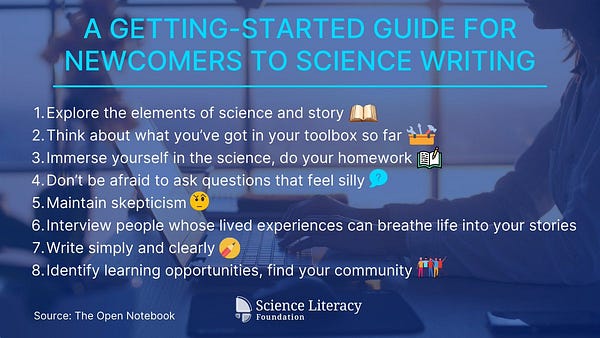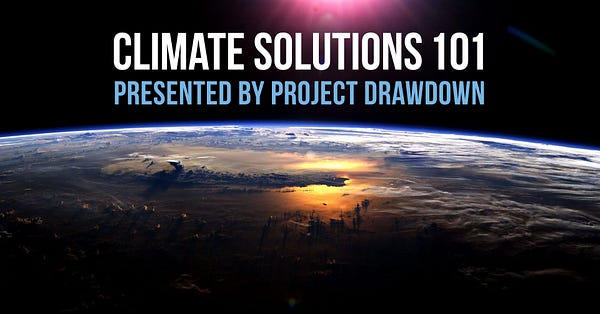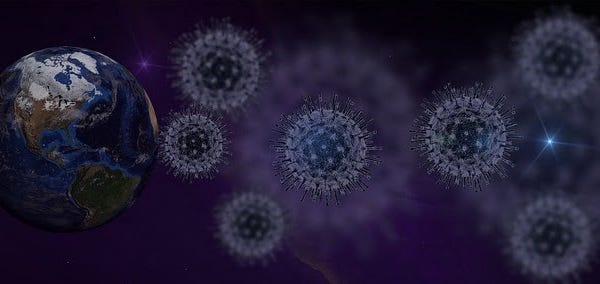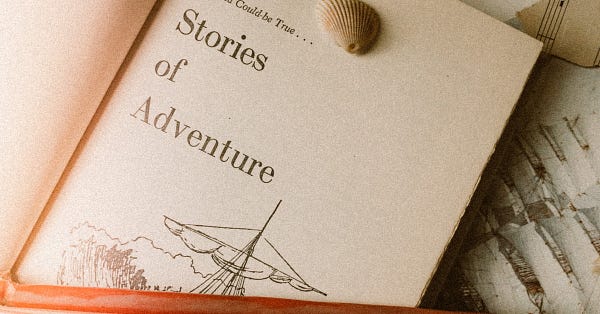✍️Science Writing News Roundup #41 (April 25, 2021)
Science journalism grows up + The best and worst of times for science reporting + Climate journalism enters the solutions era
Climate journalism enters the solutions era. A growing number of US news outlets are focusing not only on the threats or impacts of climate change, but—finally—on what we can possibly do about it. (Photo by Karsten Würth on Unsplash)
💡 Articles
Science journalism grows up. The most important contribution of science reporters, according to Deborah Blum, is to portray research accurately in both its rights and its wrongs and stand unflinchingly for the integrity of the story.
The best and worst of times for science reporting. “Science journalists are right to celebrate the wonders of science. But they also need to bring detachment and skepticism to their coverage,” writes Tim Appenzeller, the Editor of News at Science.
Communication is central to the mission of science. The future of our species and planet hinges on our scientific creativity to tackle future challenges. However, the trust of the public in scientific processes needs to be earned and kept, which will require inclusive, self-reflecting, honest and inspiring science communication.
Media Fellow Q&A #3: A global newsroom. The British Science Association placed six scientists at the heart of UK media outlets, in a year where science journalism has captured the world’s attention. So, how did it go?
Covering modern data analysis: A guide to AI and computational modeling. Science journalists have a particular responsibility to avoid falling prey to hype when communicating about studies that use AI and computational modeling.
💎 Opportunities
Apply for the Sue Palminteri WildTech Reporting Fellowship. This opportunity primarily involves writing stories that cover conservation technology-related research.
Submit a story: Help the Solutions Story Tracker complete the landscape of solutions journalism. Submit your stories about responses that address warming temperatures, responses about how we can better educate people on the environment, and health responses from Africa or East Asia.
The Swiss Academies of Arts and Sciences is looking for media professionals or students under 31 years of age who wish to implement projects in the field of science journalism. The Prix Média Newcomer awards three projects in science journalism with 3,000 CHF and a winning prize of 4,000 CHF.
The UNSW Bragg Student Prize for Science Writing 2021 (a competition for Year 7-10 students in Australia) is now open.




🎙️ Videos and podcasts
The Longform Podcast: Polk Award Winners with Helen Branswell, an infectious disease and global health reporter for STAT.
Interview with science journalist and author Michael Marshall.
The QUEST Podcast – Episode 3: climate change. This episode discusses the main challenges, and possible solutions, that arise when scientists and journalists work together.
Northwest Science Writers Associations presents Telling Stories: a panel on culturally responsive AI
Professor Nick Lane discusses the importance of scientific communication and good science writing, as well as his research into the origin of life.
Issues facing freelance writers in 2021 (Freelancers Union)
Science sources: where to find them and how to vet them (KSJ Science Editing Webinar Series)
🧰 Resources
“Forever chemicals” contaminating U.S. communities. SciLine interviewed Dr. Jamie DeWitt about the health effects of PFAS exposure, and the lack of consensus on what level of exposure is “safe.”
New data resource lists research on infection prevention from COVID-19 vaccines. A new data section at the AHCJ Medical Studies and COVID-19 Core Topics includes a list of the studies through April 20 which look at how well the vaccines prevent transmission.




👏 News
Robin Lloyd elected president of CASW: Freelance science writer and editor Robin Lloyd has been elected president of the Council for the Advancement of Science Writing, a nonprofit organization working to increase the quality and quantity of science news reaching the public.
Congratulations to the 2021 Mass Media Science & Engineering Fellows! This 10-week summer program places science, engineering, and mathematics students at media organizations in the United States.
2021-22 Taylor/Blakeslee Fellows pursue journalism with a passion for science, justice. Six talented journalists have been awarded prestigious Taylor/Blakeslee University Fellowships for 2021–22 from the Council for the Advancement of Science Writing.
🎫 Events
P&P Live! Naomi Oreskes | Why Trust Science? with Frank Sesno (April 26, 2021)
Covering Covid-19: How Journalists Tackled the Biggest Science Story of Our Time (April 28, 2021)
A Virtual Conversation with Josh Fischman, Senior Editor at Scientific American Magazine (April 29, 2021)
Design Hacks: How to create attention-grabbing visuals (April 30, 2021)
Covering Climate Solutions (April 30, 2021)
Introductory Storytelling Workshop, Story Collider (May 10, 2021)
🧭 Jobs and internships
Freelance Science Writer, The Center for Cancer Research (CCR), Bethesda, MD
Freelance Science Writer, The American Institute of Physics (AIP), Remote
Science writer, The Science Entrepreneur Club, Remote
Science/Content Writer, The Behavioural Insights Team, Remote
Senior Writer (Science Journalism), Live Science, New York, NY
More jobs 👉Science Writing News Roundup #40
👉 Don’t miss any updates from the Science Writing News Roundup:
Worried you missed something? See previous newsletters here. What would you like to see in the newsletter? Please send me your suggestions by replying to this email: sciencewriting@substack.com😃
If you liked this post, share it with your friends 💙






